Assessment Workbook 3: CHC52015 Diploma of Community Services Project
VerifiedAdded on 2023/05/31
|60
|8410
|131
Project
AI Summary
This assessment workbook, designed for the CHC52015 Diploma of Community Services, focuses on personal and professional development within the context of case management. The workbook includes a knowledge assessment with short answer questions and a project component. The project requires students to nominate a community services organization, research case management roles, identify industry trends, create and implement a personal development plan, and engage in a structured reflection process. The assessment covers the units of competency CHCPRP003 (Reflect on and improve own professional practice) and BSBWOR501 (Manage personal work priorities and professional development). It emphasizes competency-based assessment principles, the dimensions of competency, reasonable adjustments, and the rules of evidence. The workbook provides a comprehensive guide to the assessment process, including assessment methods, resources, and detailed instructions for each task.
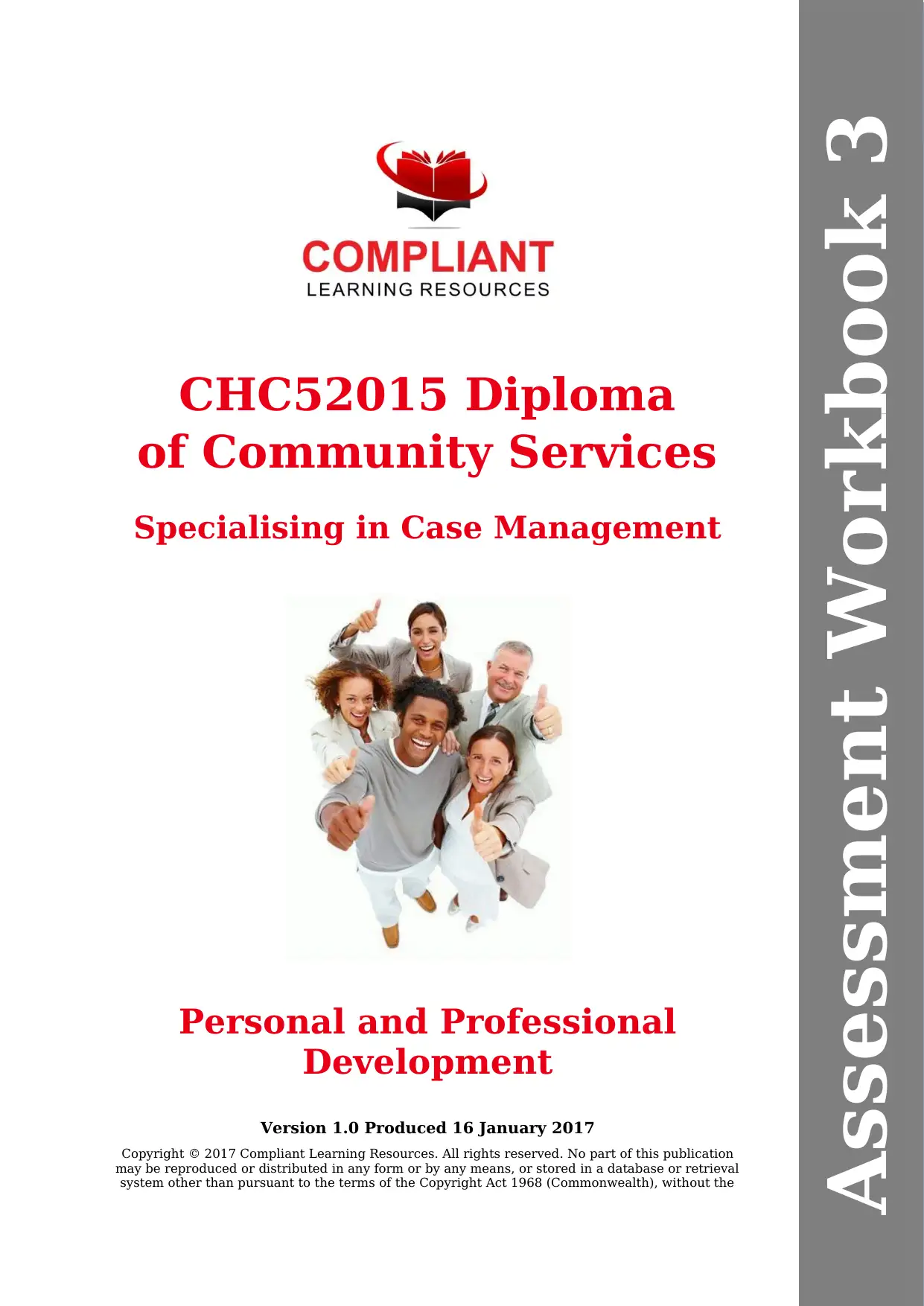
CHC52015 Diploma
of Community Services
Specialising in Case Management
Personal and Professional
Development
Version 1.0 Produced 16 January 2017
Copyright © 2017 Compliant Learning Resources. All rights reserved. No part of this publication
may be reproduced or distributed in any form or by any means, or stored in a database or retrieval
system other than pursuant to the terms of the Copyright Act 1968 (Commonwealth), without the
Assessment Workbook 3
of Community Services
Specialising in Case Management
Personal and Professional
Development
Version 1.0 Produced 16 January 2017
Copyright © 2017 Compliant Learning Resources. All rights reserved. No part of this publication
may be reproduced or distributed in any form or by any means, or stored in a database or retrieval
system other than pursuant to the terms of the Copyright Act 1968 (Commonwealth), without the
Assessment Workbook 3
Paraphrase This Document
Need a fresh take? Get an instant paraphrase of this document with our AI Paraphraser

prior written permission of
Compliant Learning Resources
Assessment Workbook 3Version No. 1.0 Produced 16 January 2017
Page 2 © Compliant Learning Resources
Compliant Learning Resources
Assessment Workbook 3Version No. 1.0 Produced 16 January 2017
Page 2 © Compliant Learning Resources
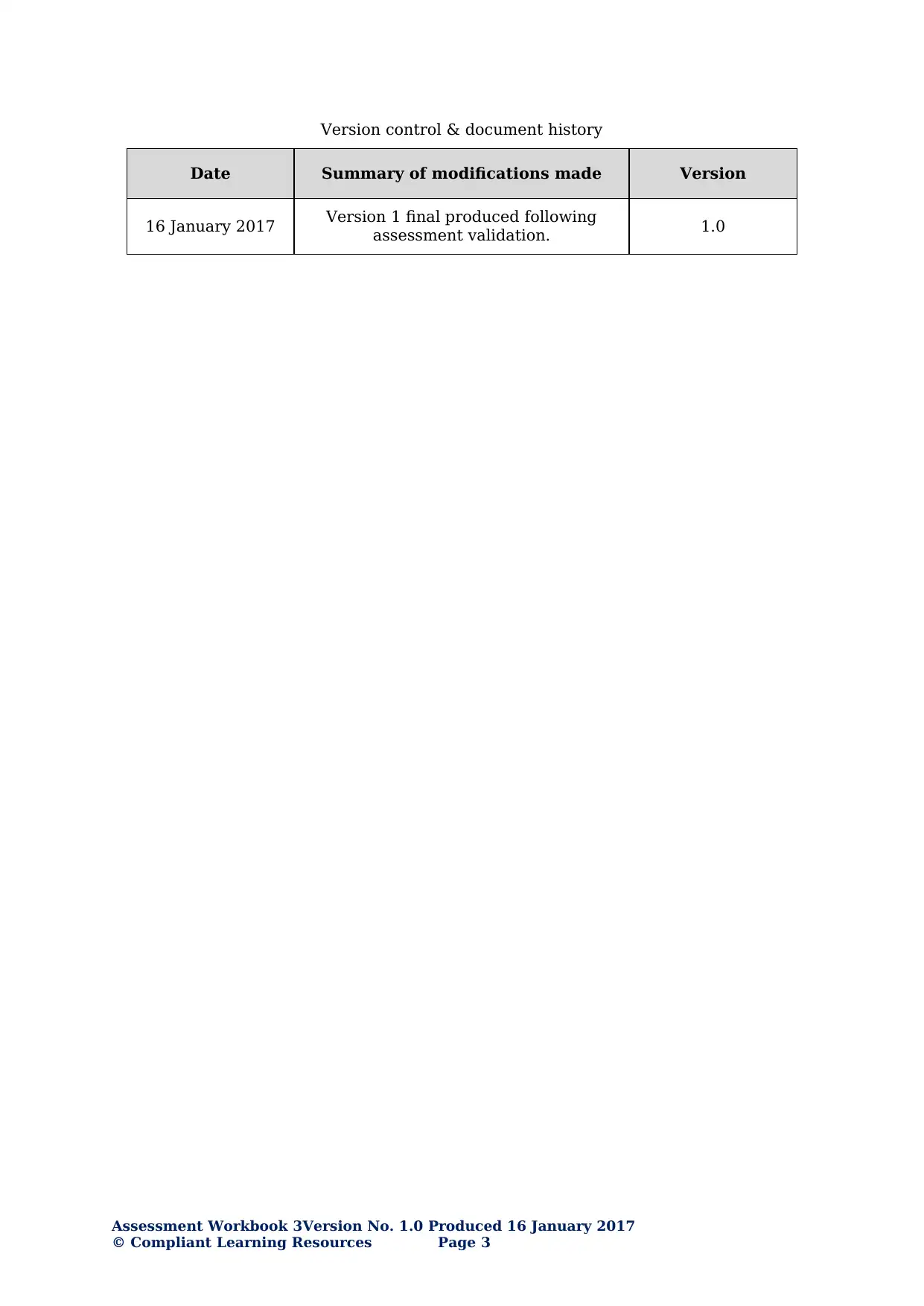
Version control & document history
Date Summary of modifications made Version
16 January 2017 Version 1 final produced following
assessment validation. 1.0
Assessment Workbook 3Version No. 1.0 Produced 16 January 2017
© Compliant Learning Resources Page 3
Date Summary of modifications made Version
16 January 2017 Version 1 final produced following
assessment validation. 1.0
Assessment Workbook 3Version No. 1.0 Produced 16 January 2017
© Compliant Learning Resources Page 3
⊘ This is a preview!⊘
Do you want full access?
Subscribe today to unlock all pages.

Trusted by 1+ million students worldwide
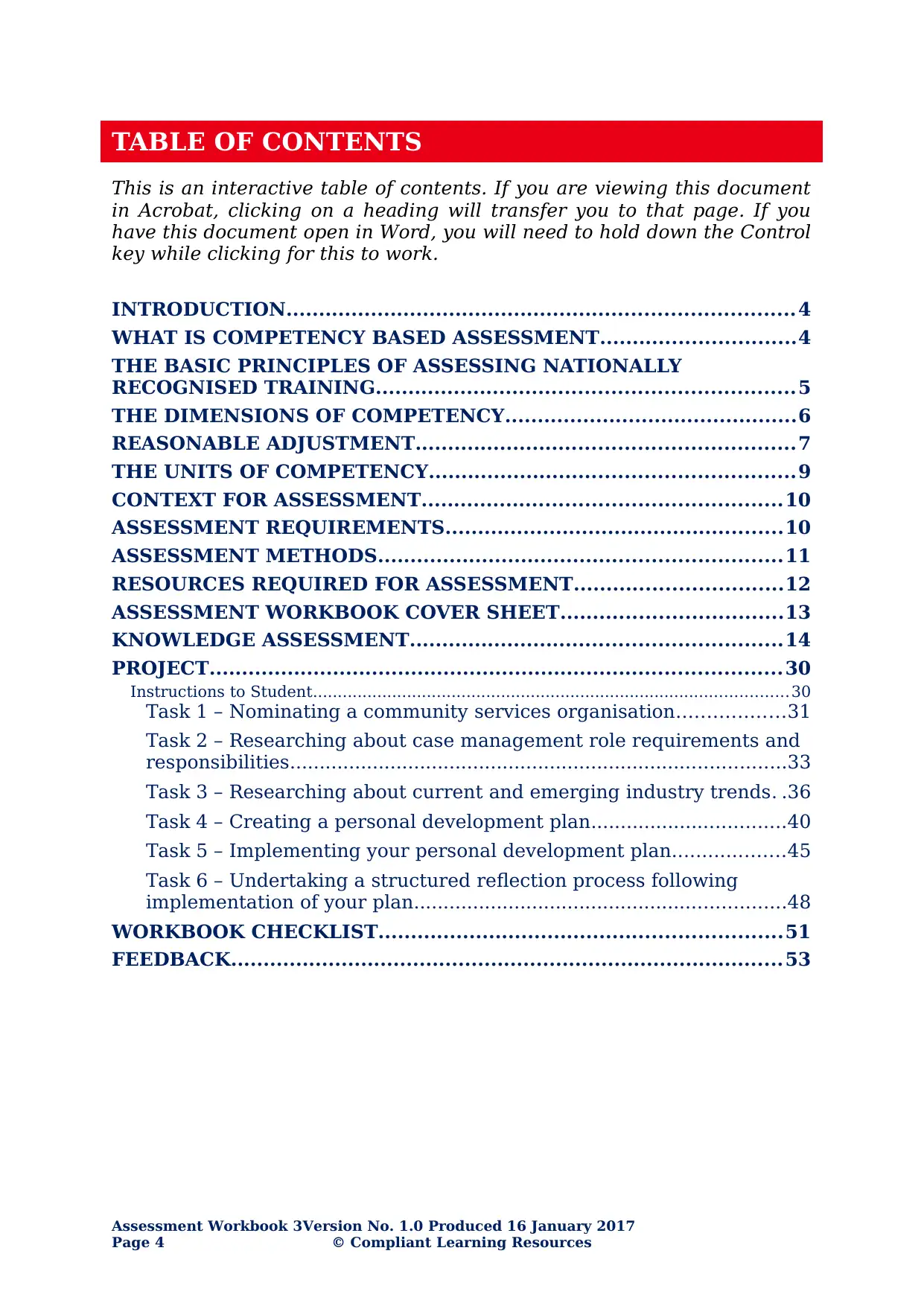
TABLE OF CONTENTS
This is an interactive table of contents. If you are viewing this document
in Acrobat, clicking on a heading will transfer you to that page. If you
have this document open in Word, you will need to hold down the Control
key while clicking for this to work.
INTRODUCTION..............................................................................4
WHAT IS COMPETENCY BASED ASSESSMENT..............................4
THE BASIC PRINCIPLES OF ASSESSING NATIONALLY
RECOGNISED TRAINING................................................................5
THE DIMENSIONS OF COMPETENCY.............................................6
REASONABLE ADJUSTMENT..........................................................7
THE UNITS OF COMPETENCY........................................................9
CONTEXT FOR ASSESSMENT.......................................................10
ASSESSMENT REQUIREMENTS....................................................10
ASSESSMENT METHODS..............................................................11
RESOURCES REQUIRED FOR ASSESSMENT................................12
ASSESSMENT WORKBOOK COVER SHEET..................................13
KNOWLEDGE ASSESSMENT.........................................................14
PROJECT........................................................................................30
Instructions to Student................................................................................................30
Task 1 – Nominating a community services organisation..................31
Task 2 – Researching about case management role requirements and
responsibilities....................................................................................33
Task 3 – Researching about current and emerging industry trends. .36
Task 4 – Creating a personal development plan.................................40
Task 5 – Implementing your personal development plan...................45
Task 6 – Undertaking a structured reflection process following
implementation of your plan...............................................................48
WORKBOOK CHECKLIST..............................................................51
FEEDBACK.....................................................................................53
Assessment Workbook 3Version No. 1.0 Produced 16 January 2017
Page 4 © Compliant Learning Resources
This is an interactive table of contents. If you are viewing this document
in Acrobat, clicking on a heading will transfer you to that page. If you
have this document open in Word, you will need to hold down the Control
key while clicking for this to work.
INTRODUCTION..............................................................................4
WHAT IS COMPETENCY BASED ASSESSMENT..............................4
THE BASIC PRINCIPLES OF ASSESSING NATIONALLY
RECOGNISED TRAINING................................................................5
THE DIMENSIONS OF COMPETENCY.............................................6
REASONABLE ADJUSTMENT..........................................................7
THE UNITS OF COMPETENCY........................................................9
CONTEXT FOR ASSESSMENT.......................................................10
ASSESSMENT REQUIREMENTS....................................................10
ASSESSMENT METHODS..............................................................11
RESOURCES REQUIRED FOR ASSESSMENT................................12
ASSESSMENT WORKBOOK COVER SHEET..................................13
KNOWLEDGE ASSESSMENT.........................................................14
PROJECT........................................................................................30
Instructions to Student................................................................................................30
Task 1 – Nominating a community services organisation..................31
Task 2 – Researching about case management role requirements and
responsibilities....................................................................................33
Task 3 – Researching about current and emerging industry trends. .36
Task 4 – Creating a personal development plan.................................40
Task 5 – Implementing your personal development plan...................45
Task 6 – Undertaking a structured reflection process following
implementation of your plan...............................................................48
WORKBOOK CHECKLIST..............................................................51
FEEDBACK.....................................................................................53
Assessment Workbook 3Version No. 1.0 Produced 16 January 2017
Page 4 © Compliant Learning Resources
Paraphrase This Document
Need a fresh take? Get an instant paraphrase of this document with our AI Paraphraser
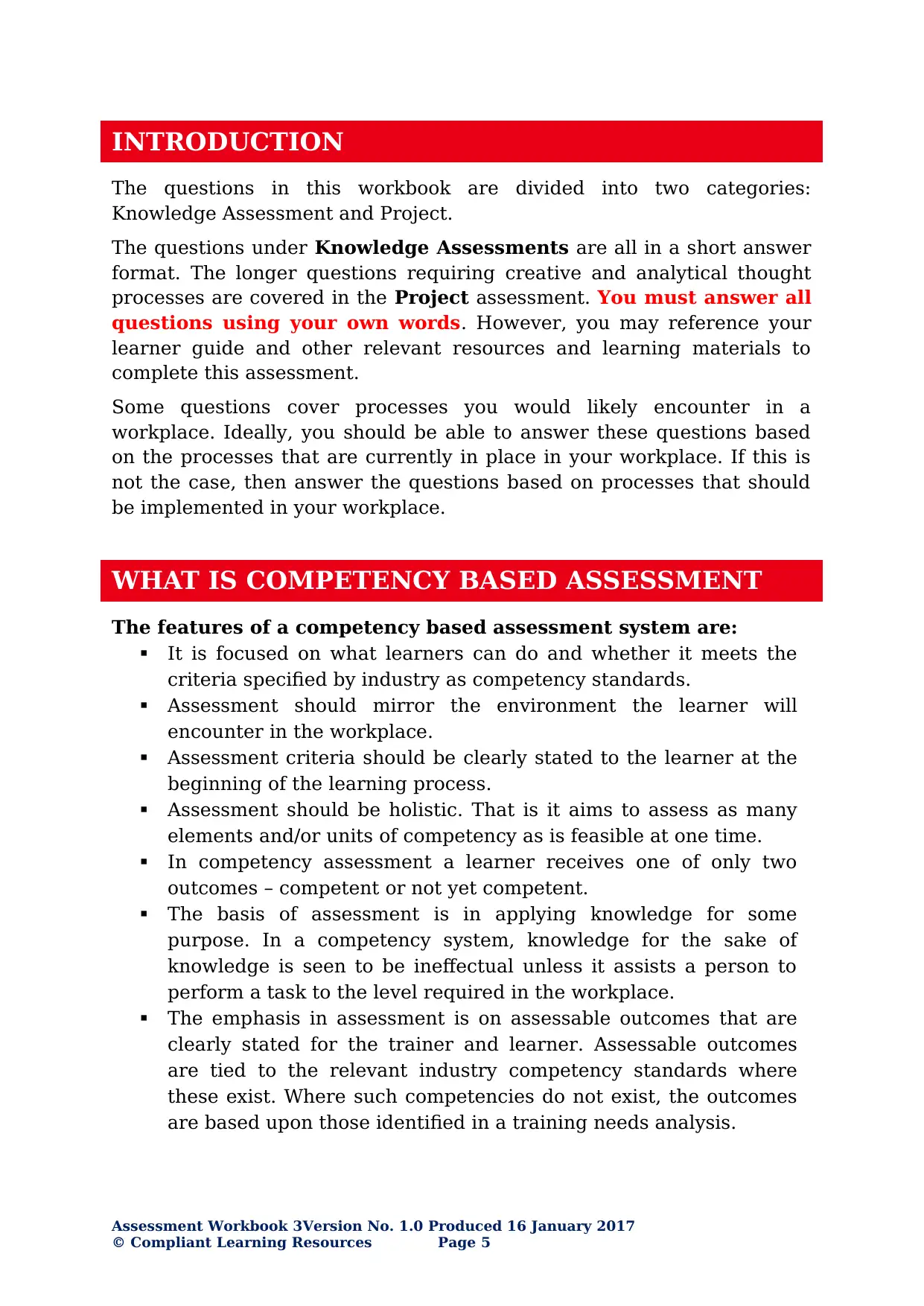
INTRODUCTION
The questions in this workbook are divided into two categories:
Knowledge Assessment and Project.
The questions under Knowledge Assessments are all in a short answer
format. The longer questions requiring creative and analytical thought
processes are covered in the Project assessment. You must answer all
questions using your own words. However, you may reference your
learner guide and other relevant resources and learning materials to
complete this assessment.
Some questions cover processes you would likely encounter in a
workplace. Ideally, you should be able to answer these questions based
on the processes that are currently in place in your workplace. If this is
not the case, then answer the questions based on processes that should
be implemented in your workplace.
WHAT IS COMPETENCY BASED ASSESSMENT
The features of a competency based assessment system are:
It is focused on what learners can do and whether it meets the
criteria specified by industry as competency standards.
Assessment should mirror the environment the learner will
encounter in the workplace.
Assessment criteria should be clearly stated to the learner at the
beginning of the learning process.
Assessment should be holistic. That is it aims to assess as many
elements and/or units of competency as is feasible at one time.
In competency assessment a learner receives one of only two
outcomes – competent or not yet competent.
The basis of assessment is in applying knowledge for some
purpose. In a competency system, knowledge for the sake of
knowledge is seen to be ineffectual unless it assists a person to
perform a task to the level required in the workplace.
The emphasis in assessment is on assessable outcomes that are
clearly stated for the trainer and learner. Assessable outcomes
are tied to the relevant industry competency standards where
these exist. Where such competencies do not exist, the outcomes
are based upon those identified in a training needs analysis.
Assessment Workbook 3Version No. 1.0 Produced 16 January 2017
© Compliant Learning Resources Page 5
The questions in this workbook are divided into two categories:
Knowledge Assessment and Project.
The questions under Knowledge Assessments are all in a short answer
format. The longer questions requiring creative and analytical thought
processes are covered in the Project assessment. You must answer all
questions using your own words. However, you may reference your
learner guide and other relevant resources and learning materials to
complete this assessment.
Some questions cover processes you would likely encounter in a
workplace. Ideally, you should be able to answer these questions based
on the processes that are currently in place in your workplace. If this is
not the case, then answer the questions based on processes that should
be implemented in your workplace.
WHAT IS COMPETENCY BASED ASSESSMENT
The features of a competency based assessment system are:
It is focused on what learners can do and whether it meets the
criteria specified by industry as competency standards.
Assessment should mirror the environment the learner will
encounter in the workplace.
Assessment criteria should be clearly stated to the learner at the
beginning of the learning process.
Assessment should be holistic. That is it aims to assess as many
elements and/or units of competency as is feasible at one time.
In competency assessment a learner receives one of only two
outcomes – competent or not yet competent.
The basis of assessment is in applying knowledge for some
purpose. In a competency system, knowledge for the sake of
knowledge is seen to be ineffectual unless it assists a person to
perform a task to the level required in the workplace.
The emphasis in assessment is on assessable outcomes that are
clearly stated for the trainer and learner. Assessable outcomes
are tied to the relevant industry competency standards where
these exist. Where such competencies do not exist, the outcomes
are based upon those identified in a training needs analysis.
Assessment Workbook 3Version No. 1.0 Produced 16 January 2017
© Compliant Learning Resources Page 5
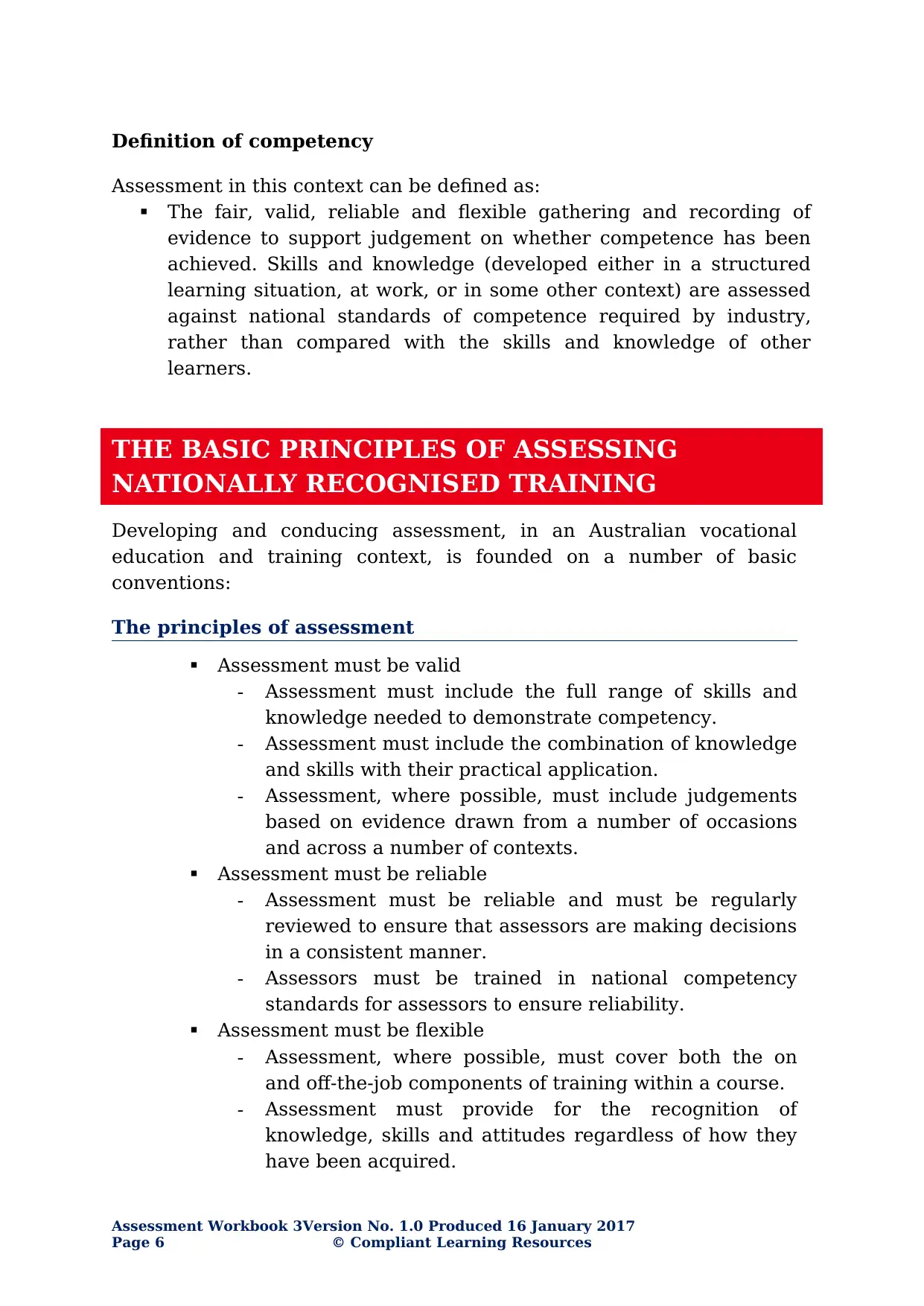
Definition of competency
Assessment in this context can be defined as:
The fair, valid, reliable and flexible gathering and recording of
evidence to support judgement on whether competence has been
achieved. Skills and knowledge (developed either in a structured
learning situation, at work, or in some other context) are assessed
against national standards of competence required by industry,
rather than compared with the skills and knowledge of other
learners.
THE BASIC PRINCIPLES OF ASSESSING
NATIONALLY RECOGNISED TRAINING
Developing and conducing assessment, in an Australian vocational
education and training context, is founded on a number of basic
conventions:
The principles of assessment
Assessment must be valid
- Assessment must include the full range of skills and
knowledge needed to demonstrate competency.
- Assessment must include the combination of knowledge
and skills with their practical application.
- Assessment, where possible, must include judgements
based on evidence drawn from a number of occasions
and across a number of contexts.
Assessment must be reliable
- Assessment must be reliable and must be regularly
reviewed to ensure that assessors are making decisions
in a consistent manner.
- Assessors must be trained in national competency
standards for assessors to ensure reliability.
Assessment must be flexible
- Assessment, where possible, must cover both the on
and off-the-job components of training within a course.
- Assessment must provide for the recognition of
knowledge, skills and attitudes regardless of how they
have been acquired.
Assessment Workbook 3Version No. 1.0 Produced 16 January 2017
Page 6 © Compliant Learning Resources
Assessment in this context can be defined as:
The fair, valid, reliable and flexible gathering and recording of
evidence to support judgement on whether competence has been
achieved. Skills and knowledge (developed either in a structured
learning situation, at work, or in some other context) are assessed
against national standards of competence required by industry,
rather than compared with the skills and knowledge of other
learners.
THE BASIC PRINCIPLES OF ASSESSING
NATIONALLY RECOGNISED TRAINING
Developing and conducing assessment, in an Australian vocational
education and training context, is founded on a number of basic
conventions:
The principles of assessment
Assessment must be valid
- Assessment must include the full range of skills and
knowledge needed to demonstrate competency.
- Assessment must include the combination of knowledge
and skills with their practical application.
- Assessment, where possible, must include judgements
based on evidence drawn from a number of occasions
and across a number of contexts.
Assessment must be reliable
- Assessment must be reliable and must be regularly
reviewed to ensure that assessors are making decisions
in a consistent manner.
- Assessors must be trained in national competency
standards for assessors to ensure reliability.
Assessment must be flexible
- Assessment, where possible, must cover both the on
and off-the-job components of training within a course.
- Assessment must provide for the recognition of
knowledge, skills and attitudes regardless of how they
have been acquired.
Assessment Workbook 3Version No. 1.0 Produced 16 January 2017
Page 6 © Compliant Learning Resources
⊘ This is a preview!⊘
Do you want full access?
Subscribe today to unlock all pages.

Trusted by 1+ million students worldwide
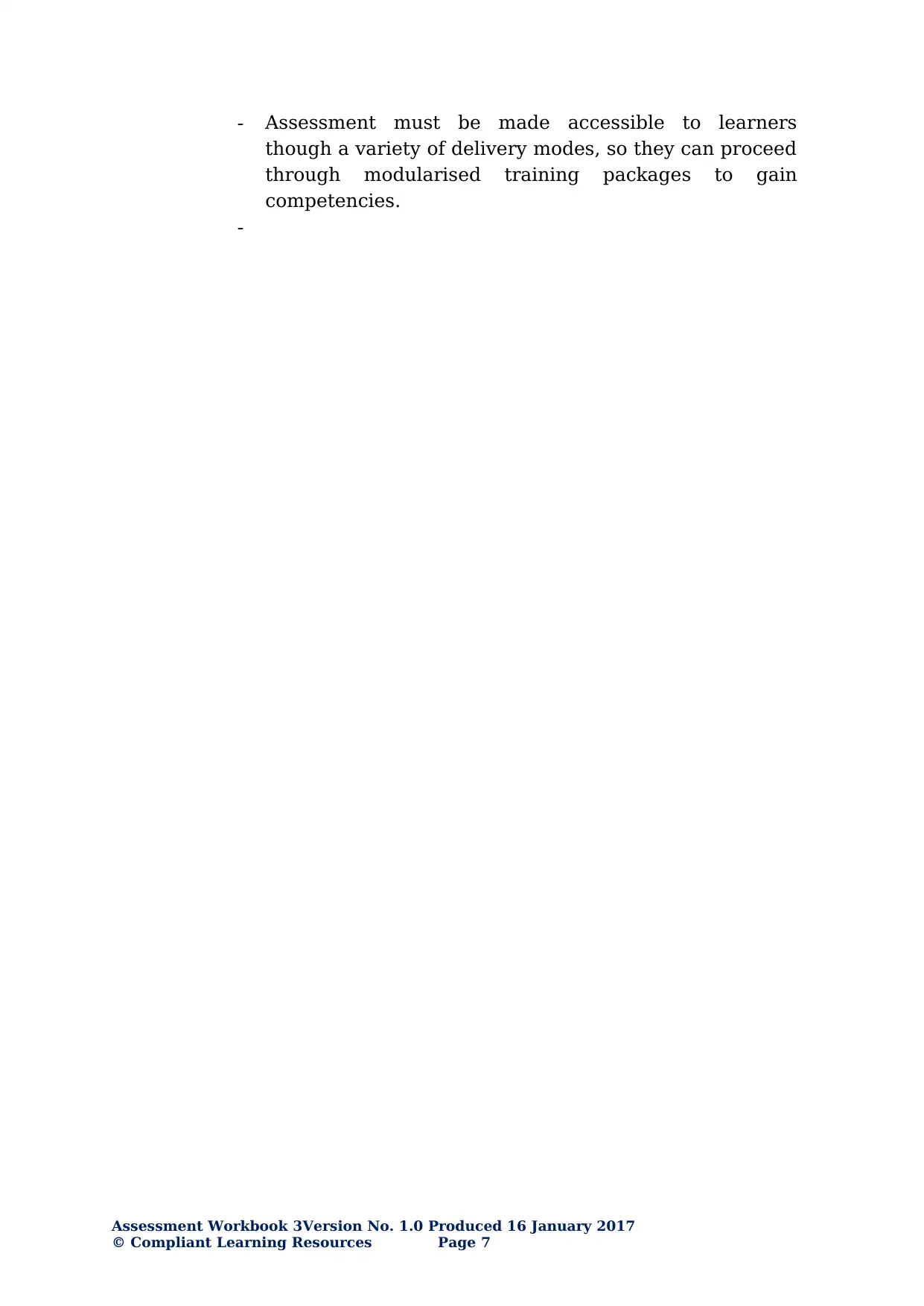
- Assessment must be made accessible to learners
though a variety of delivery modes, so they can proceed
through modularised training packages to gain
competencies.
-
Assessment Workbook 3Version No. 1.0 Produced 16 January 2017
© Compliant Learning Resources Page 7
though a variety of delivery modes, so they can proceed
through modularised training packages to gain
competencies.
-
Assessment Workbook 3Version No. 1.0 Produced 16 January 2017
© Compliant Learning Resources Page 7
Paraphrase This Document
Need a fresh take? Get an instant paraphrase of this document with our AI Paraphraser
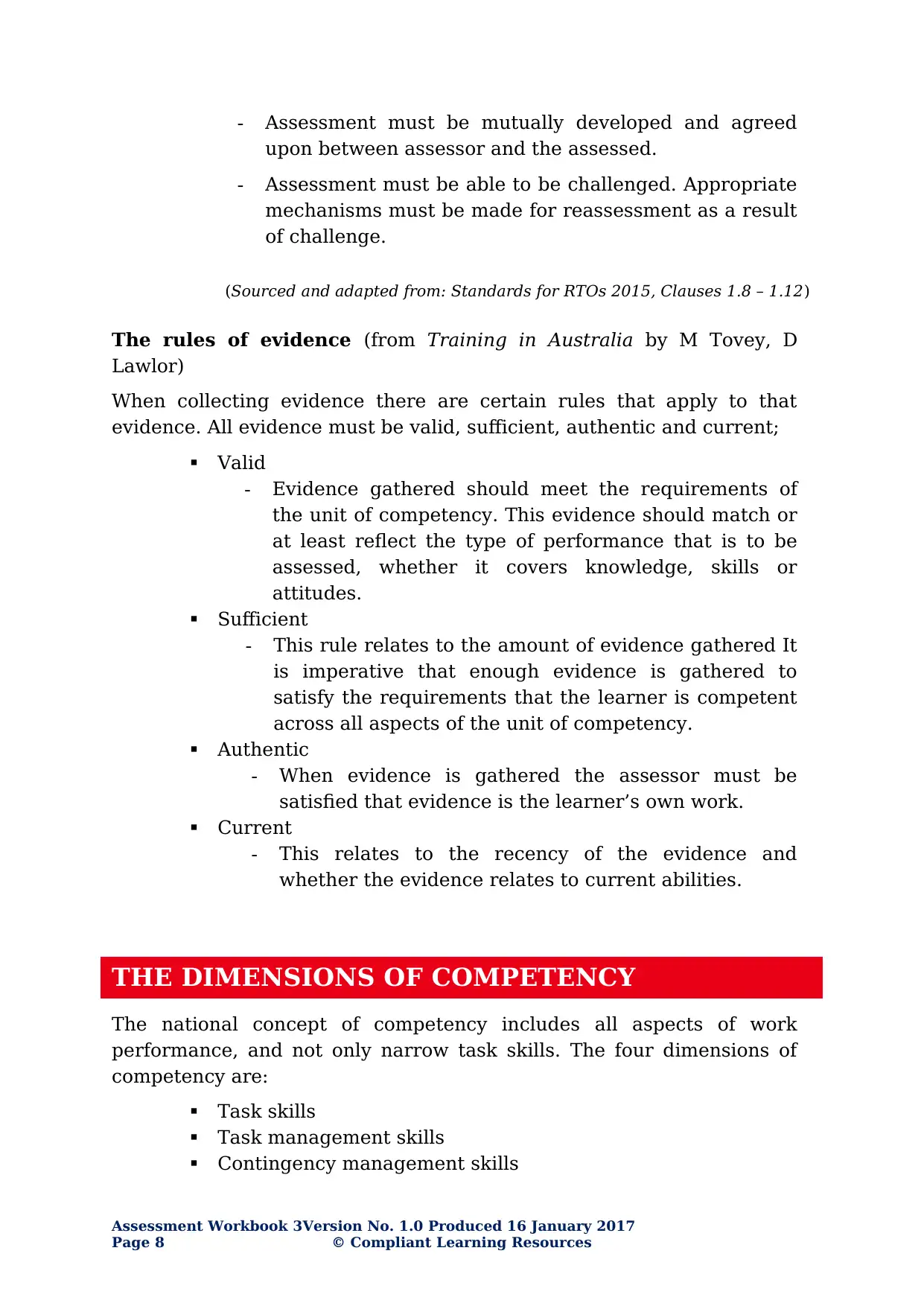
- Assessment must be mutually developed and agreed
upon between assessor and the assessed.
- Assessment must be able to be challenged. Appropriate
mechanisms must be made for reassessment as a result
of challenge.
(Sourced and adapted from: Standards for RTOs 2015, Clauses 1.8 – 1.12)
The rules of evidence (from Training in Australia by M Tovey, D
Lawlor)
When collecting evidence there are certain rules that apply to that
evidence. All evidence must be valid, sufficient, authentic and current;
Valid
- Evidence gathered should meet the requirements of
the unit of competency. This evidence should match or
at least reflect the type of performance that is to be
assessed, whether it covers knowledge, skills or
attitudes.
Sufficient
- This rule relates to the amount of evidence gathered It
is imperative that enough evidence is gathered to
satisfy the requirements that the learner is competent
across all aspects of the unit of competency.
Authentic
- When evidence is gathered the assessor must be
satisfied that evidence is the learner’s own work.
Current
- This relates to the recency of the evidence and
whether the evidence relates to current abilities.
THE DIMENSIONS OF COMPETENCY
The national concept of competency includes all aspects of work
performance, and not only narrow task skills. The four dimensions of
competency are:
Task skills
Task management skills
Contingency management skills
Assessment Workbook 3Version No. 1.0 Produced 16 January 2017
Page 8 © Compliant Learning Resources
upon between assessor and the assessed.
- Assessment must be able to be challenged. Appropriate
mechanisms must be made for reassessment as a result
of challenge.
(Sourced and adapted from: Standards for RTOs 2015, Clauses 1.8 – 1.12)
The rules of evidence (from Training in Australia by M Tovey, D
Lawlor)
When collecting evidence there are certain rules that apply to that
evidence. All evidence must be valid, sufficient, authentic and current;
Valid
- Evidence gathered should meet the requirements of
the unit of competency. This evidence should match or
at least reflect the type of performance that is to be
assessed, whether it covers knowledge, skills or
attitudes.
Sufficient
- This rule relates to the amount of evidence gathered It
is imperative that enough evidence is gathered to
satisfy the requirements that the learner is competent
across all aspects of the unit of competency.
Authentic
- When evidence is gathered the assessor must be
satisfied that evidence is the learner’s own work.
Current
- This relates to the recency of the evidence and
whether the evidence relates to current abilities.
THE DIMENSIONS OF COMPETENCY
The national concept of competency includes all aspects of work
performance, and not only narrow task skills. The four dimensions of
competency are:
Task skills
Task management skills
Contingency management skills
Assessment Workbook 3Version No. 1.0 Produced 16 January 2017
Page 8 © Compliant Learning Resources

Assessment Workbook 3Version No. 1.0 Produced 16 January 2017
© Compliant Learning Resources Page 9
© Compliant Learning Resources Page 9
⊘ This is a preview!⊘
Do you want full access?
Subscribe today to unlock all pages.

Trusted by 1+ million students worldwide
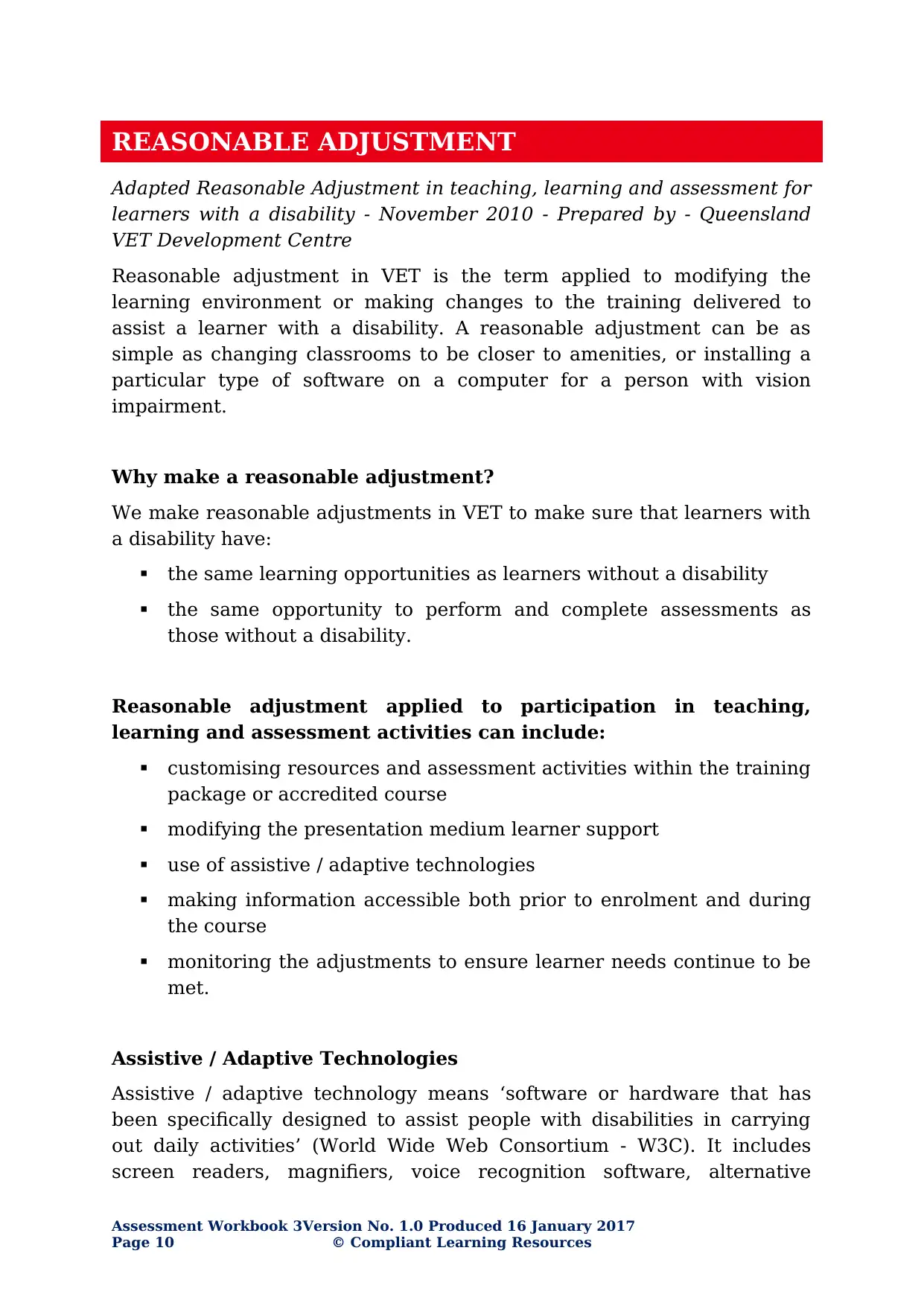
REASONABLE ADJUSTMENT
Adapted Reasonable Adjustment in teaching, learning and assessment for
learners with a disability - November 2010 - Prepared by - Queensland
VET Development Centre
Reasonable adjustment in VET is the term applied to modifying the
learning environment or making changes to the training delivered to
assist a learner with a disability. A reasonable adjustment can be as
simple as changing classrooms to be closer to amenities, or installing a
particular type of software on a computer for a person with vision
impairment.
Why make a reasonable adjustment?
We make reasonable adjustments in VET to make sure that learners with
a disability have:
the same learning opportunities as learners without a disability
the same opportunity to perform and complete assessments as
those without a disability.
Reasonable adjustment applied to participation in teaching,
learning and assessment activities can include:
customising resources and assessment activities within the training
package or accredited course
modifying the presentation medium learner support
use of assistive / adaptive technologies
making information accessible both prior to enrolment and during
the course
monitoring the adjustments to ensure learner needs continue to be
met.
Assistive / Adaptive Technologies
Assistive / adaptive technology means ‘software or hardware that has
been specifically designed to assist people with disabilities in carrying
out daily activities’ (World Wide Web Consortium - W3C). It includes
screen readers, magnifiers, voice recognition software, alternative
Assessment Workbook 3Version No. 1.0 Produced 16 January 2017
Page 10 © Compliant Learning Resources
Adapted Reasonable Adjustment in teaching, learning and assessment for
learners with a disability - November 2010 - Prepared by - Queensland
VET Development Centre
Reasonable adjustment in VET is the term applied to modifying the
learning environment or making changes to the training delivered to
assist a learner with a disability. A reasonable adjustment can be as
simple as changing classrooms to be closer to amenities, or installing a
particular type of software on a computer for a person with vision
impairment.
Why make a reasonable adjustment?
We make reasonable adjustments in VET to make sure that learners with
a disability have:
the same learning opportunities as learners without a disability
the same opportunity to perform and complete assessments as
those without a disability.
Reasonable adjustment applied to participation in teaching,
learning and assessment activities can include:
customising resources and assessment activities within the training
package or accredited course
modifying the presentation medium learner support
use of assistive / adaptive technologies
making information accessible both prior to enrolment and during
the course
monitoring the adjustments to ensure learner needs continue to be
met.
Assistive / Adaptive Technologies
Assistive / adaptive technology means ‘software or hardware that has
been specifically designed to assist people with disabilities in carrying
out daily activities’ (World Wide Web Consortium - W3C). It includes
screen readers, magnifiers, voice recognition software, alternative
Assessment Workbook 3Version No. 1.0 Produced 16 January 2017
Page 10 © Compliant Learning Resources
Paraphrase This Document
Need a fresh take? Get an instant paraphrase of this document with our AI Paraphraser

keyboards, devices for grasping, visual alert systems, digital note takers.
Assessment Workbook 3Version No. 1.0 Produced 16 January 2017
© Compliant Learning Resources Page 11
Assessment Workbook 3Version No. 1.0 Produced 16 January 2017
© Compliant Learning Resources Page 11
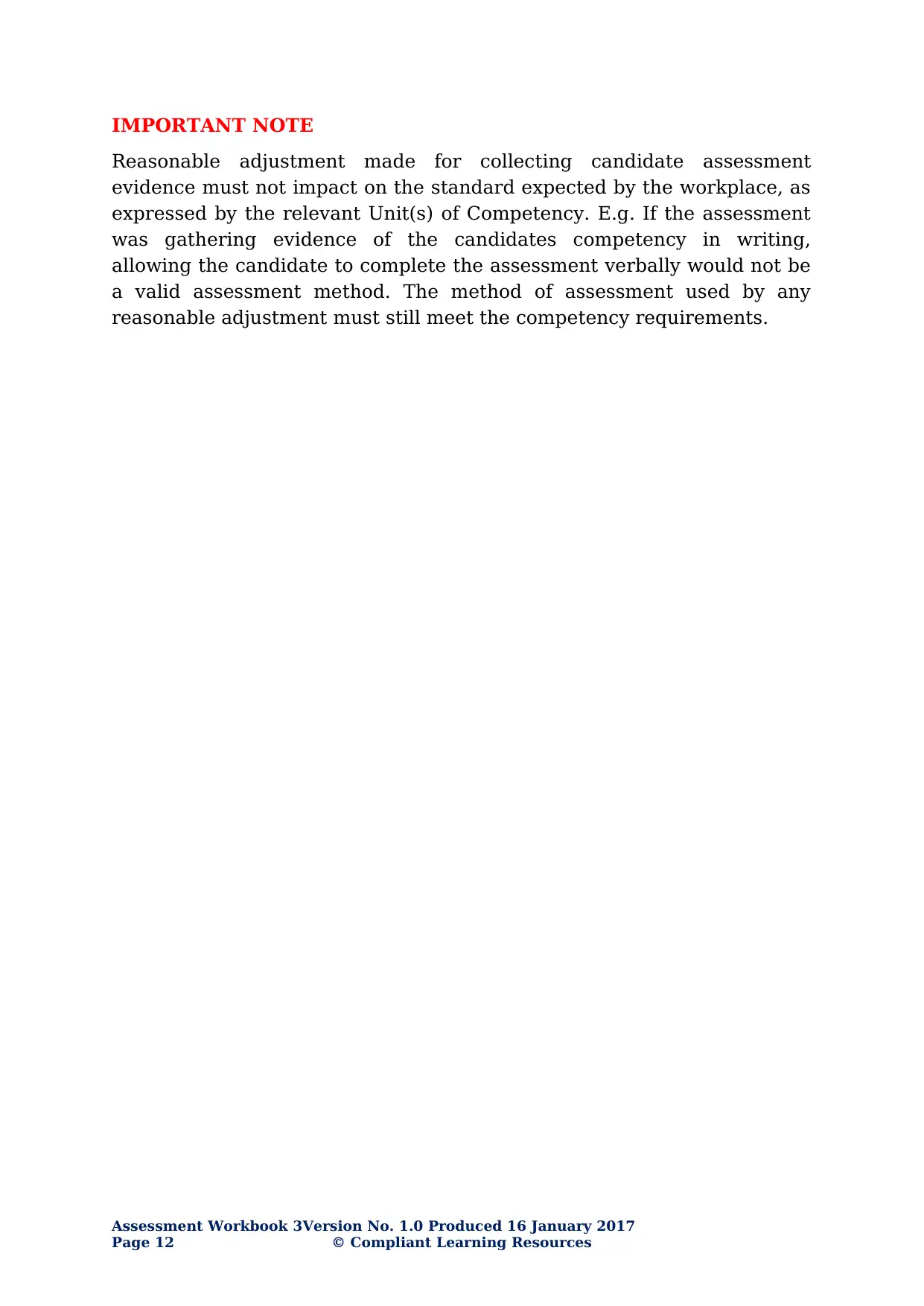
IMPORTANT NOTE
Reasonable adjustment made for collecting candidate assessment
evidence must not impact on the standard expected by the workplace, as
expressed by the relevant Unit(s) of Competency. E.g. If the assessment
was gathering evidence of the candidates competency in writing,
allowing the candidate to complete the assessment verbally would not be
a valid assessment method. The method of assessment used by any
reasonable adjustment must still meet the competency requirements.
Assessment Workbook 3Version No. 1.0 Produced 16 January 2017
Page 12 © Compliant Learning Resources
Reasonable adjustment made for collecting candidate assessment
evidence must not impact on the standard expected by the workplace, as
expressed by the relevant Unit(s) of Competency. E.g. If the assessment
was gathering evidence of the candidates competency in writing,
allowing the candidate to complete the assessment verbally would not be
a valid assessment method. The method of assessment used by any
reasonable adjustment must still meet the competency requirements.
Assessment Workbook 3Version No. 1.0 Produced 16 January 2017
Page 12 © Compliant Learning Resources
⊘ This is a preview!⊘
Do you want full access?
Subscribe today to unlock all pages.

Trusted by 1+ million students worldwide
1 out of 60
Related Documents
Your All-in-One AI-Powered Toolkit for Academic Success.
+13062052269
info@desklib.com
Available 24*7 on WhatsApp / Email
![[object Object]](/_next/static/media/star-bottom.7253800d.svg)
Unlock your academic potential
Copyright © 2020–2026 A2Z Services. All Rights Reserved. Developed and managed by ZUCOL.





